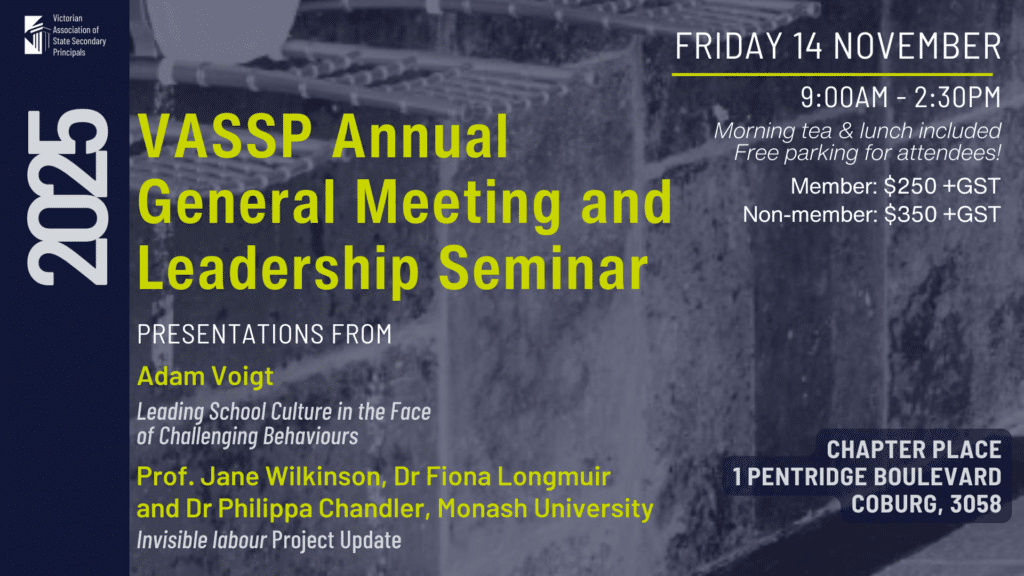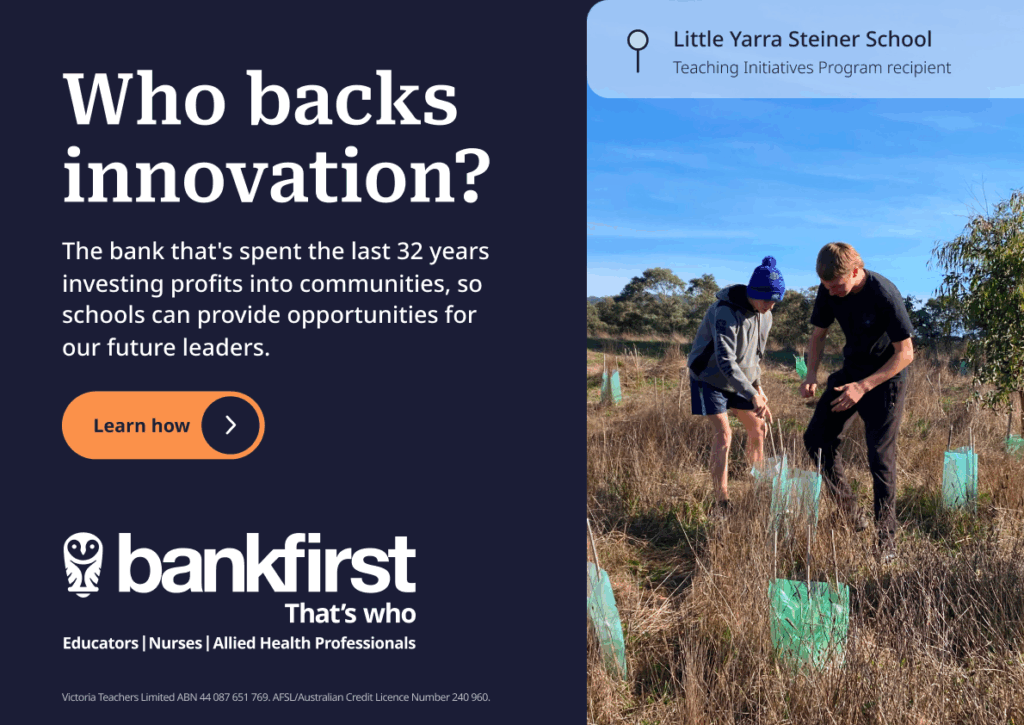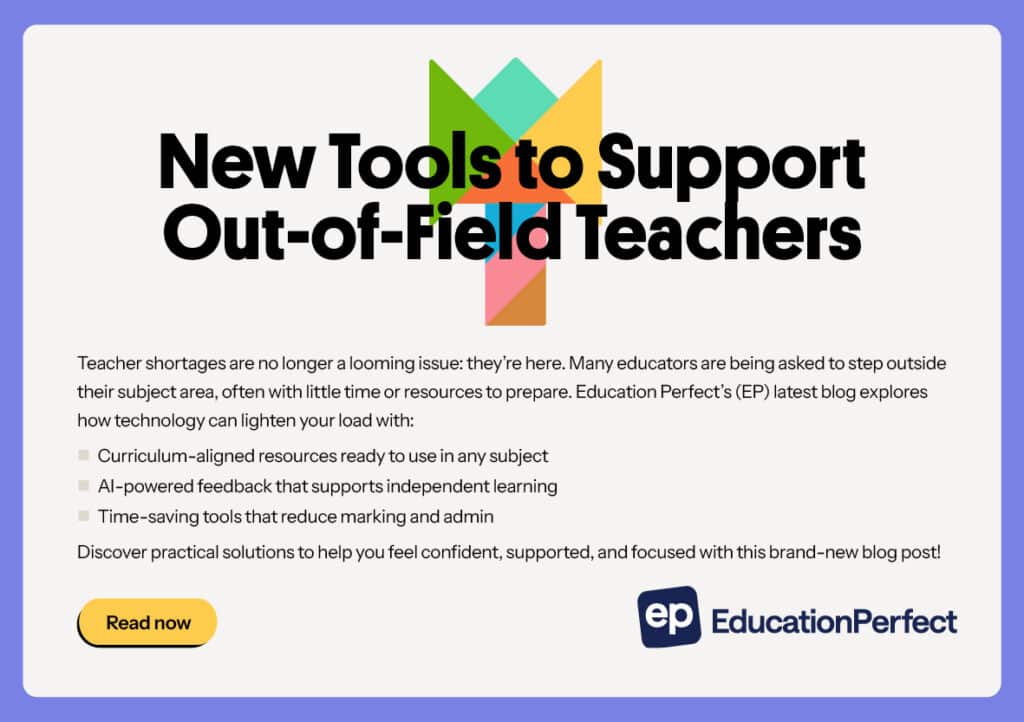INFORM Newsletter
2025, Term 4. Issue 7
President's Report

Colin Axup
VASSP President
Term 4 holds a special place in the hearts of secondary school leaders; a term of joyous occasions and celebrations and the stress of exams and long-term planning. That is the joy of fourth term.
The challenge of conducting exams is increasing. The increase in special provisions and finding suitable invigilators impacts on all schools; metro and rural, large and small.
The recently released Stage 2 Organisational Review of the Victorian Curriculum and Assessment Authority (VCAA) represents a critical step in rebuilding confidence in one of the state’s most important educational institutions. Following the examination issues of recent years, this “root-and-branch” review examined the systems, leadership, and culture of the VCAA and sets out a comprehensive pathway for reform.
For schools, the Review brings both reassurance and realism. Reassurance that systemic change is underway and that early reforms, including the appointment of a new CEO and strengthened quality controls, are having an impact. The review reminds us that strong institutions, like strong schools, are built on clarity of purpose, sound governance, and respect for those who serve within them. The renewal of the VCAA is not merely administrative; it is about restoring trust in the fairness and integrity of the system that underpins every student’s achievement. The Association has been engaged throughout this process and continues to be engaged as a key stakeholder.
Two other reports were also released during the term break, both from the Victorian Institute of Teaching (VIT). Report 1 reviewed VIT’s approach to assessing overseas teaching qualifications to ensure Victoria remains an attractive and high-quality destination for international educators. The review recommends clearer policies, improved communication with applicants, and a new pre-assessment service to provide greater certainty before relocation. It also proposes more flexible recognition of teaching experience and qualifications, along with a new category of Permission to Teach to support skilled teachers entering the system. These changes will hopefully balance flexibility with rigour.
Report 2 aims to simplify and modernise the PTT framework. The current ten categories will be consolidated into three ; Qualifying, Specialist–Instructor and Conditional, creating a clearer, more flexible system that responds to workforce pressures while maintaining professional standards.
The changes emphasise shared responsibility between schools and the Institute through stronger mentoring and support, longer and more flexible PTT grants, and clearer communication for applicants and employers. These reforms aim to strengthen the profession and better support schools during ongoing teacher shortages.
The recently released Anti-Bullying Rapid Review calls for a national reset on how schools understand and respond to bullying. It defines bullying as part of a continuum of harmful behaviours, whether physical, social or online, that undermine a student’s right to safety and inclusion. The Review emphasises that all harmful behaviours warrant action, regardless of intent or formal classification, and that responses must be early, proportionate and trauma-informed.
A proposed National Standard on Bullying in Australian Schools sets clear expectations: schools must act within two school days of a report, communicate openly with families, and ensure consistent, transparent processes. Central to this is a whole-of-school approach, where leaders, teachers, students and parents work together to build cultures of respect and kindness. This is the component of the report that will require much more detail for schools.
The Review also highlights the need to equip staff through training in prevention, early intervention and managing online harms, while ensuring their own wellbeing and safety.
Ultimately, this report reminds us that preventing bullying is not a task for schools alone, it is a shared societal responsibility to create learning environments where every young person feels safe, valued and able to thrive. This is an argument the Association consistently articulates.
As an Association, guided by discussions at State Committee, we have decided that we will not engage with the Legislative Council Legal and Socials Issues Committee inquiry into public school funding. This is an issue that needs to be resolved between the Commonwealth and State governments with continued engagement with ASPA, which has a national overview of the issue.
In the last couple of weeks, several members have raised concerns with their indicative SRP and the changes that have occurred. For many schools, the removal of TLI funding has had a substantial effect compared to previous years and has pushed indicative budgets into considerable deficit. The Association has raised these initial concerns with the Department and at our State Committee meeting with the Deputy Secretary Financial Policy and Information Services. While we continue to have these discussions I would encourage you to attend the SRP professional learning opportunity on 29 October where our own SRP expert, Sue Peddlesden will take you through the details of the changes. I would note that the capital works threshold has also been increased from $100K to $150K.
As this is my last term as president of the Association, I look forward to connecting with many of you at our upcoming regional meetings or the AGM on 14 November. When we gather, we garner both strength and knowledge from our colleagues.
Thank you for all that you continue to do for your schools, your staff, and your students.
Need to Know
VALE: Arthur Toussaint
VASSP are saddened by the recent passing of Life Member, Arthur Toussaint.
Across thirty-five remarkable years in public education, Arthur Toussaint embodied the finest traditions of Victorian school leadership. A teacher of English with a gift for connection, he rose to become Principal of Galvin Park Secondary College, where his vision reshaped opportunities for countless students. A founding force in regional principal networks and a guiding hand in VASSP’s evolution, he was both innovator and mentor; lifting others through his belief in service, collaboration and the transformative power of public education. His legacy endures in the leaders he nurtured and the communities he strengthened.
2026 MEMBERSHIP FEE ADJUSTMENT - EFFECTIVE 1 JAN 2026
The VASSP Executive has endorsed an annual CPI-aligned membership fee increase. For 2026, this will be set at $675 + GST, consistent with the RBA’s forecast inflation range of 2–3%. This approach ensures fees remain fair, transparent and in line with broader economic conditions.
TEACHER SHORTAGE IMPACT SURVEY - TERM 4
Survey link: Term 4, 2025 Teacher Shortage Impact Survey
*VASSP continues to encourage members to share how their school is responding to staffing shortages. This survey offers continuous insights into the impact of staff shortages in secondary schools. The data supports our advocacy, highlighting the nuances and complexity of managing the secondary school environment.
OPPORTUNITIES
Grow your own Talent!
The Master of Teaching Internship Program (MTSI) is the University of Melbourne’s employment-based teaching degree. Interns are employed with a school to teach in one or two Learning (Subject) Areas while they complete their Master of Teaching over a 12 or 24-month period.
The employment period for our 2026 MTSI cohort has commenced and will run until 11 November.
Further information about the 2026 program can be found in this flyer.
If you would like to participate or hear more, please send us an email at foe-teachinginternship@unimelb.edu.au or call us on 9035 3008.
Your Voice Matters - Take Part in the Australian Teacher Workforce Survey
The 2025 Australian Teacher Workforce Survey is now open and school leaders play an important role in encouraging participation.
The survey helps build a national picture of the teaching profession – from employment conditions to career intentions and wellbeing – and helps inform policies and drive change within the teaching profession.
Please encourage your staff to take part by:
- Reminding them to check their inbox for their unique link
- Sharing information about the survey in your staff notices/bulletins
- Allowing time during a staff meeting
- Leading by example and completing the survey yourself
Support your staff’s future – complete the Teacher Survey today. It’s anonymous and takes just 10 minutes. All registered teachers receive their unique survey link via email from their teacher regulatory authority.
Learn more about the survey and download resources to help promote it.
Stronger data today builds a stronger profession tomorrow!
Share your views on school safety
The safety of our school communities is important to all of us.
The Victorian Government wants to hear from you about addressing unacceptable behaviour by adults in Victorian school communities, including where abusive behaviour occurs online and on social media, as part of a consultation to strengthen protections for school staff.
Please take a moment to complete this short de-identified survey on the Engage Victoria platform.
Your participation will help the Victorian Government to better understand community perspectives on this important issue and the impact it has on school staff, students, families and the wider school community.
Your voice matters.
Keeping school staff safe onsite and online consultation survey is open until Monday 10 November.
ASPA Update
Advocacy & Activism: Nothing About Us, Without Us!
By Dr. Peter Mader, Former President of SASPA and Vice President of ASPA
In a recent ASPA post, Australia’s Education System Is Not Failing — But the Narrative Is, Craig Petersen was critical of our nation’s reliance upon standardised test data in shaping education directions, strategy and policy. It is a criticism shared by many, including academics such as Ashenden (2024), Bonnor et al (2021), Reid (2020) and Sahlberg (2023). But, despite the various and compelling arguments for change, our politicians remain resolute in their reliance upon standardised test data – a practice in keeping with the OECD’s global neo-liberal strategy for increased competition, standardisation and test-based accountability. Unfortunately, what was designed as a productivity measure – i.e., a way for government to monitor the schooling sector’s outputs in relation to their funding inputs – has become the nation’s proxy for the quality of schooling. Yet, by their own measures – NAPLAN (nationally) and PISA (internationally) – Australia’s neoliberal education project has failed.
So, what can principal associations do?
Advocacy
Principal associations perform two major functions. One is to build the professional capital of secondary education leaders. The other is to advocate for the work of educational leaders. Here, our Association presidents perform the role of policy advocates, positioned in the contested space between governments (and bureaucracies) and principals (who’s professional and policy interests they represent). But, as good as their advocacy is, it is performed within a set of norms established by the owners of policy, i.e., governments and their bureaucracies. It is the policy owners who determine systemic directions, goals and strategies and, if and when they consult principal associations, it is usually after an unyielding internal position has been formed. To accentuate this point, our problems with the nation’s over-reliance on standardised test data was never of the profession’s making. Rather, it was a commitment made and maintained by Education Ministers (see The Adelaide Declaration, 1999 and The Melbourne Declaration, 2008) without ever initiating meaningful consultation with the principal associations. And, whilst principal associations and their allies have provided considerable advocacy for change, it has been ignored by government.
So, in circumstances such as this, is advocacy enough?
To make a case for change, advocacy relies on communication and negotiation. The ASPA Policy Briefing 2025 recognises this and calls for the establishment of formalised policy networks in each jurisdiction to enhance communication and collaboration between principals’ associations and education departments, ensuring meaningful consultation on policy decisions. Still, from a tactical viewpoint, collective advocacy is the mechanism for policy changes to be negotiated within the pre-existing norms. Since it was government that designed and sustained a system we recognise as being over-reliant on standardised testing, is it likely they would voluntarily accept the changes we and others advocate? If they haven’t already accepted our well-made arguments, will they ever?
Perhaps, then, it is time for us to change gears and consider augmenting our advocacy with activism.
Activism
Unlike advocacy which follows a methodical and respectful process of truth-telling and relies on policy changes to be negotiated within pre-existing norms, activism is played by a different set of rules. Tactically, activism uses more confrontational methods such as protest, resistance, counter-conduct and refusal. For some, activism is akin to a political campaign (e.g., Black Lives Matter). For others, it is a commitment to social policy disruption (e.g., School Strike for Climate). Essentially, collective activism provides a means for large-scale issues (e.g., a fairer and more socially just public education system for all Australians) to be recognised and understood as the basis for policy change. In my recent doctoral study, Principal associations: the struggle for political agency in neoliberalising policy regimes (Mader, 2024), I discuss a range of activist tactics principal associations could adopt to expand their political work. One of these is counter-hegemonic intervention.
Counter-Hegemonic Intervention
A concept developed by Chantal Mouffe (2009) for western democracies to engineer political, social and cultural change, counter-hegemonic intervention is a set of related actions designed to dismantle the existing hegemony (i.e., neoliberalism) and replace it with a better alternative. There are three acts to counter-hegemonic intervention, i.e., disarticulation, re-articulation and counter-hegemony.
An obvious starting point for principal associations looking to enact such a process would be to mount a challenge to the Government’s narrow standardisation agenda. Here, the disarticulation (i.e., a challenge to existing power and its discourse) has already begun. Principal associations and various academics have already denounced Australia’s neoliberal project and outlined its harmful consequences. However, if we were to adopt Mouffe’s process, this would be followed by a rearticulation (i.e., an alternative discourse). A plausible example of this would be to build the profession’s case for school and principal accountabilities to be matched to the broader purposes of schooling (i.e., qualification, socialisation and subjectification – see Biesta 2009) and, by implication, emphasising the need for more open and extensive school success measures. But any rearticulation must have the backing of the membership and, better still, the support from a coalition of allies (including academics and parent organisations). The logic here is that political momentum is built from a broadening of the base. The path to counter hegemony (i.e., the realisation of a clear alternative to the untrusted policies of neoliberalism) is a long one. Consequently, dissent must remain open until such time as the government’s policy settings change to reflect the alternatives the movement has offered.
It should be noted that activism is an adversarial venture not an antagonistic one. Principal associations can still be supportive of various measures governments take that are socially just and fair and are in support of our profession’s interests. But, when a policy setting is fundamentally wrong, and advocacy from our profession is not producing much needed change, activism might be a path worth taking.
Nothing About Us, Without Us
So, in remembering that the problem of our nation’s over-reliance upon standardised test data is not of our making, perhaps the activist position principal associations should adopt immediately is a “nothing about us, without us” attitude. That is, hold to the expectation that any development of government policy affecting the work of school principals be co-designed with our elected principal peak-bodies.
Nothing about us, without us!
References
Ashenden, D. (2024). Unbeaching the Whale. Carlton, Victoria: Inside Story
Biesta, G. (2009). Good education in an age of measurement: On the need to reconnect with the question of purpose in education. Educational Assessment, Evaluation and Accountability, 21(1), 33-46.
Bonnor, C., Kidson, P., Piccoli, A., Sahlberg, P., & Wilson, R. (2021). Structural failure: Why Australia keeps falling short of our educational goals. Gonski Institute for Education, University of NSW.
Mader, P. (2024). Principal associations: the struggle for political agency in neoliberalising policy regimes. Flinders University, College of Education, Psychology and Social Work.
Mouffe, C. (2009). The Importance of Engaging the State. In J. Pugh (Ed.), What is Radical Politics Today? (pp230-237). London: Palgrave Macmillan UK.
Reid, A. (2020). Changing Australian education: How policy is taking us backwards and what can be done about it. Routledge.
Sahlberg, P. (2023). Trends in global education reform since the 1990s: Looking for the right way. International journal of educational development, 98, 1027-48.
If you would like to receive the ASPA Bulletin and be part of the mailing list, please register here: https://www.aspa.asn.au/contact
*VASSP values our members’ privacy and will not share member information without authorisation
Chief Operating Officer’s Report

Amy Rashid
Chief Operating Officer
Education at a Glance: system settings that shape outcomes
OECD’s Education at a Glance 2025 provides an overview of how education systems are performing across OECD countries. The 2025 edition focuses on tertiary attainment, equity, investment and workforce pressures. The data shows that Australia’s overall investment is slightly above the OECD average, with stronger public funding at school level and lower public investment at tertiary level.
What the data shows
- Tertiary attainment continues to rise.
- Equity gaps remain entrenched.
- Teacher supply and retention pressures are increasing.
Investment is above the OECD average overall but varies significantly by education level

Why this matters?
Educational attainment is a key driver of social and economic mobility. International evidence suggests that countries with strong regulatory settings, targeted funding and clear equity goals achieve more consistent outcomes across socio-economic groups. In Australia, funding structures and responsibilities differ between the school and tertiary sectors, shaping how investment is distributed and experienced.
Key insights for Australia
- Align tertiary growth with completion and employment outcomes.
- Address teacher supply through structural incentives and improved conditions.
- Report equity indicators annually, beyond NAPLAN and ATAR.
- Target funding explicitly to disadvantage.
The data highlights several areas that intersect with national and state responsibilities, including workforce supply, equity reporting and post-school pathways.
‘A school leader’s guide to engaging the next generation of parents’ - McCrindle
Today’s parent community is more diverse, digitally literate and time-poor than ever before. For school leaders, this shifting landscape represents both a challenge and an opportunity: to rethink engagement strategies and build stronger, more authentic partnerships.
What's changing
- Community is the new competitive advantage – Parents are seeking belonging, shared values and trust, not just academic results.
- Old engagement models aren’t working – Declining attendance and disengagement show a mismatch between traditional methods and modern expectations.
- Parent expectations are shaped by digital culture – On-demand information, personalised experiences and transparent communication are baseline expectations.
Key characteristics of the modern parent
- Values driven – School choice reflects alignment with values and character development, not just program quality.
- Time poor – Most parents want to contribute but face structural time pressures; flexible and meaningful involvement matters.
- Digitally literate, cognitively overloaded – Families prefer clear, relevant communication through mobile-friendly, intuitive platforms.
- Partnership minded – Parents want to co-create and collaborate, not just receive information.
- Future focused – Emphasis on holistic education that builds adaptability, character and life readiness.

Rethinking engagement
The report introduces a Parent Partnership Cycle:
- Scan for shifts – Understand demographic, cultural and social trends.
- Design for connection – Build engagement strategies around flexibility, clarity and belonging.
- Engage with purpose – Communicate consistently and meaningfully.
- Reflect and refine – Evaluate impact, seek feedback and adjust.
Parental engagement isn’t just about better attendance at events; it’s about strengthening trust, community and student outcomes. Schools that adapt to these shifts can turn disengagement into partnership and build thriving school communities.
How to use the guide in your next team meeting:
- Share the guide with your team and arrange a meeting to discuss reflections and work through the checklist.
- Discuss how you can prepare for and respond to the trends or improve on opportunity areas.
- Ask who in your team knows the most about this trend or opportunity to leverage internal experience and knowledge.
- Develop and action steps to ensure opportunities and learnings are captured, communicated and understood.
VASSP State Committee
The final State Committee meeting of the year brought members together to consider major policy, workforce and sector developments shaping the landscape for 2026.
Guest speakers included:
- Andrea Del Monaco, Deputy Secretary, Financial Policy & Information Services
- Liam Fitzgerald, Director, Schools Finance and Resources Branch
- David Howes, Deputy Secretary, Schools & Regional Services
- Tony Bugden, Executive Director, Schools Human Resources
Key Points of Discussion
- Cash and Credit Policy – Schools are being urged to reduce large cash holdings, with unspent government funds set to convert to credit from 2027. Clearer thresholds will guide implementation, and principals and business managers will receive additional support to manage the shift.
- VSBA School Funded Capital Works – Long approval timelines for capital projects continue to impact schools, with strong calls for faster processes and alternative delivery options.
- Sector Updates – National teacher registration, anti-bullying measures and the upcoming social media delay are expected to bring further impacts for schools in 2026.
The Role of State Committee
The State Committee advises the Executive Board on the work of the Association. It consists of elected representatives from each VASSP Regional Group and general representatives from the full membership.
Held each school term, State Committee meetings are a key channel for feedback from regional meetings and for consultation with the Department of Education and other key stakeholders.
Have Your Say in 2026
Your regional meeting is your voice at the State Committee table. Attend and share your views to help shape the issues VASSP takes forward in the new year.
Professional Learning & Upcoming Events
- Understanding the Student Resource Package (SRP) – Wednesday 29 October, Online
- VASSP AGM & Leadership Seminar – Friday 14 November, Pentridge Coburg
- Mastering the YLC Role – Wednesday 26 November, Online
- AP Connections Seminar – Friday 28 November, VASSP Offices
For further information and to register visit VASSP Professional Learning
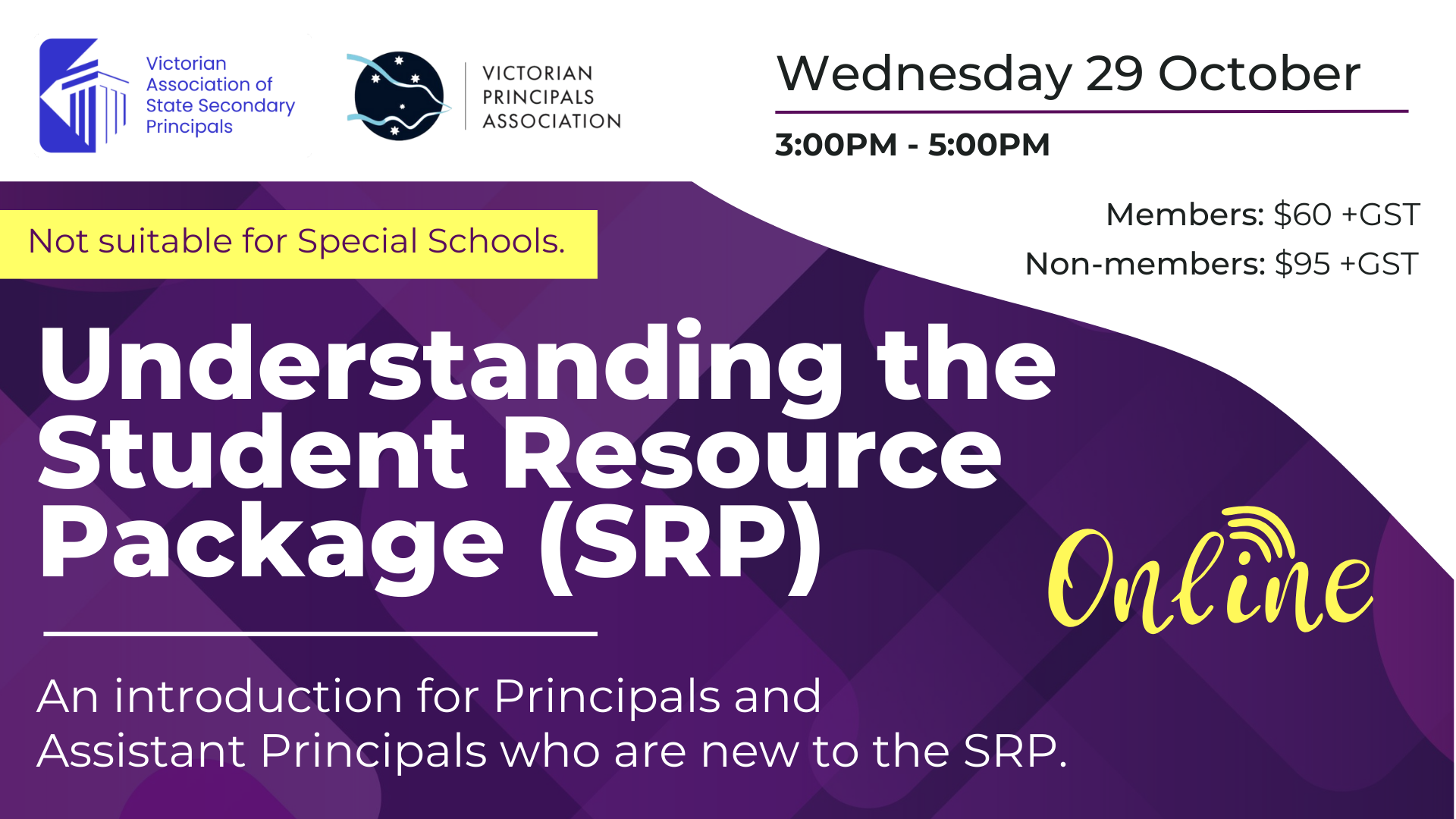
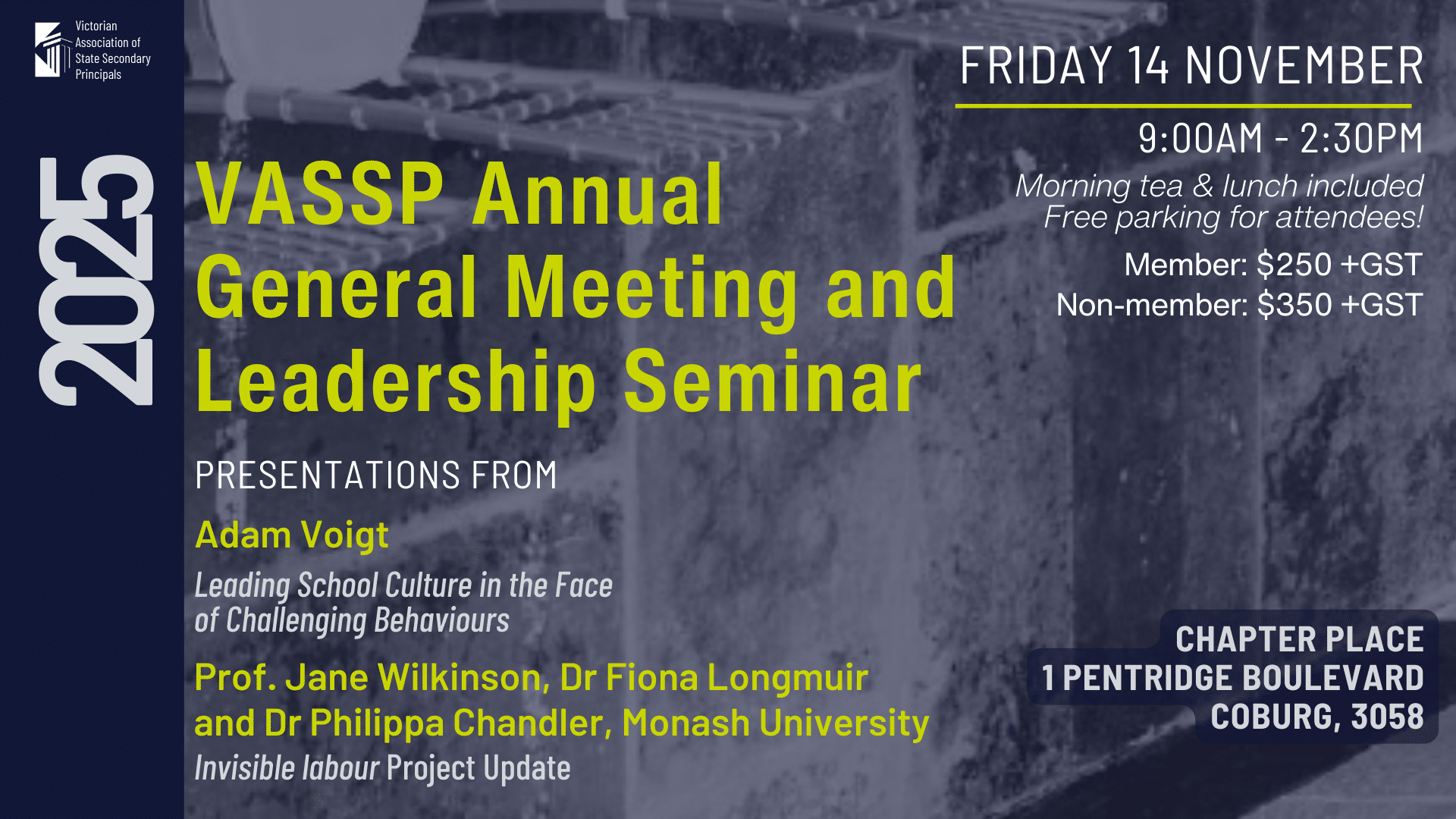
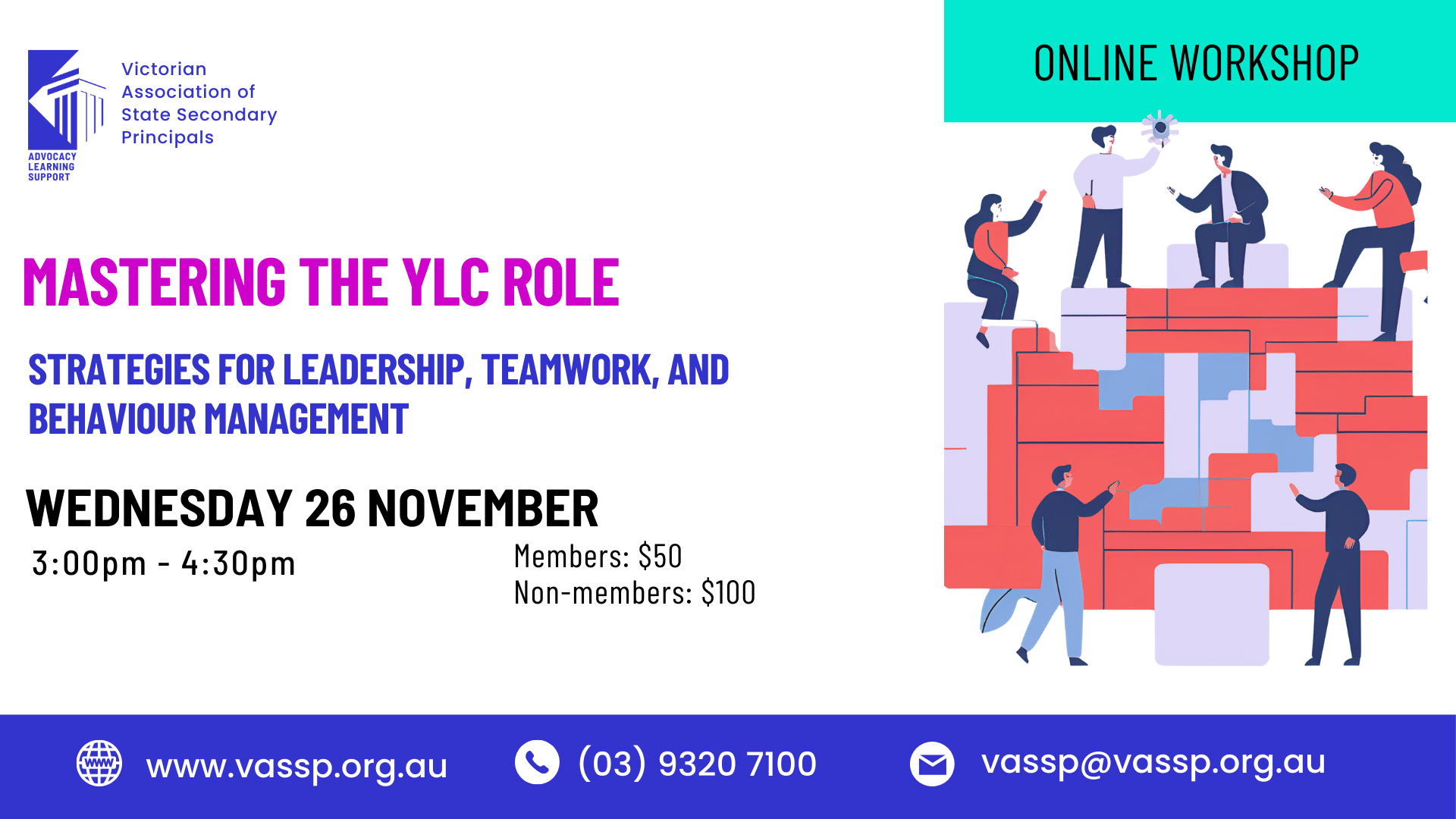

CEP PD Online - Summer Series
Session 01 – 15 October 2025, 4:00 pm to 5:00 pm
Topic: Exclusive Series with Kristi McVee: Rural Schools and Community Session One – Online Safety
Speakers: Kristi McVee, Former Detective, Child Abuse Specialist, and Online Safety Advocate and Ben McCauley, Detective Sergeant, Sex Crimes Squad.
Session 02 – 22 October 2025, 4:00 pm to 5:00 pm
Topic: Exclusive Series with Kristi McVee: Rural Schools and Community Session Two – Abuse Awareness
Speakers: Kristi McVee, Former Detective, Child Abuse Specialist, and Online Safety Advocate and Ben McCauley, Detective Sergeant, Sex Crimes Squad.
Session 03 – 29 October 2025, 4:00 pm to 5:00 pm
Topic: Exclusive Series with Kristi McVee: Rural Schools and Community Session Three – Managing the Community
Speakers: Kristi McVee, Former Detective, Child Abuse Specialist, and Online Safety Advocate and Ben McCauley, Detective Sergeant, Sex Crimes Squad.
Session 04 – 5 November 2025, 4:00 pm to 5:00 pm
Topic: Coaching and Mentoring
Speakers: Dr Julie Rowse, Conscious Leadership and Josh Valeri, Director, BTS Spark Australia.
Build Me Up (VCE)
This hybrid program is designed to build confidence and strengthen teacher content knowledge for General Mathematics and Mathematical Methods. Delivered by expert teachers and experienced presenters, it provides a clear bridge from Year 10 to VCE.
Program features:
- Two full-day in-person workshops (metro & regional) – unpack how concepts, skills, and processes are structured and sequenced from Units 1–4.
- Six online interactive sessions – deep dives into key topics; involving doing the maths together.
- Two Q&A sessions – connect with experienced educators and peers.
- Complimentary access to Build Me Up (7–10) – 14 online modules of prerequisite content (valued at $990).
Cost: MAV Members $1600 | Non-Members $2000
Locations: Brunswick, Dandenong, and Bendigo
This is an excellent way to prepare teachers stepping into VCE Mathematics for the first time or those wanting to refine and strengthen their approach.
Places are limited for the 2026 intake.
For more information, including the 2026 program dates, and to register go to: https://www.mav.vic.edu.au/Resources/Build-Me-Up/BMU-VCE
Industry Updates

Victorian Institute of Teaching response to Ministerial Direction
Report 1 – Assessment of overseas qualifications
The Victorian Institute of Teaching has released the first of two reports responding to a Ministerial Direction on overseas teaching qualifications. The focus is on building a clearer, more flexible and nationally consistent approach to registration.
Why this matters
Victoria continues to face teacher workforce shortages. A more transparent and efficient assessment process can help attract skilled teachers from overseas while maintaining high entry standards to protect student learning.
Key changes proposed
-
Qualifications Policy
- Current policy uses complex language and is unclear for applicants.
- Will be rewritten in plain English to support overseas applicants.
- Action: Immediate.
-
Assessment principles
- Unclear how overseas qualifications are currently assessed.
- Clear criteria and principles will be published and accessible.
- Action: Immediate.
-
Communications
- Unsuccessful applicants receive inconsistent feedback.
- Feedback and guidance will be standardised.
- Action: Immediate.
-
Pre-assessment service
- No early clarity for applicants or employers.
- A fee-for-service qualification check will be offered before relocation.
- Action: Commenced.
-
Recognition of experience
- Only formal qualifications currently count.
- Relevant teaching experience may be recognised alongside qualifications.
- Action: Policy and legislative change.
-
Permission to Teach (PTT)
- Existing categories are limited and restrictive.
- A new PTT category will be developed for overseas-qualified teachers.
- Action: Policy development.
-
National consistency
- Different approaches across jurisdictions cause confusion.
- Processes will be aligned to reduce complexity and support mobility.
- Action: Strategic.
At a glance
- Around 3 percent of overseas applicants do not meet registration requirements.
- Common issues include gaps in supervised teaching practice, non-degree qualifications and curriculum coverage.
- Many applicants gain registration through mutual recognition.
- The new pre-assessment service provides clarity earlier in the process.
- Legislative changes may be required to recognise teaching experience alongside qualifications.
This review aims to give schools and applicants more certainty, reduce administrative burden and strengthen national consistency while maintaining high standards.
Report 2 – Permission to Teach
The latest review of the Permission to Teach (PTT) framework by Victorian Institute of Teaching sets out a plan to simplify the system and make it more responsive to workforce needs. The recommendations balance flexibility for schools with safeguards for teaching quality and student learning.
Key changes proposed
- Rename and simplify
- Legislative change proposed to rename PTT to better reflect its limited scope.
- Consolidation of 10 categories into 3 clearer streams:
- Qualifying (pre-service teachers)
- Specialist–Instructor (critical workforce or specialist roles)
- Conditional (overseas or historically qualified teachers with minor gaps).
- Policy clarity and accessibility
- Policy rewritten in plain language to improve readability.
- Streamlined eligibility and standardised conditions for each category.
- Clearer guidance on subject area assessments and threshold criteria.
- Co-regulatory model
- Stronger role for employers through formal agreements.
- Defined support obligations (supervision, mentoring, workload planning).
- Legislative backing proposed to enforce employer responsibilities.
- Responsive regulation
- Longer PTT grants aligned with school year and ITE progression (up to 3 years).
- Removal of regulator-imposed time fraction limits to give schools and staff more flexibility.
- Clear published conditions for each category.
- Religious and bilingual instruction
- Religious instructors not required to progress to full registration in appropriate contexts.
- Greater flexibility for bilingual settings, recognising unique workforce and language needs.
- Improved communication
- Standardised, transparent feedback to successful and unsuccessful applicants.
- Clearer articulation of duties, conditions and employer obligations.
VCAA Review: A call for deep reform
The second stage of the ‘root-and-branch’ review of the Victorian Curriculum and Assessment Authority (VCAA) sets out a three-year reform agenda to rebuild public trust, modernise operations and reset governance.
The contrast is clear: Stage 1 stabilised the immediate operational risks in examination delivery. Stage 2 shifts focus to systemic change — governance, leadership, technology and trust.
Strong leadership and disciplined execution will be essential to deliver on these reforms and rebuild confidence across the system.
| Stage 1 – Incident Review (April 2025) | Stage 2 – Organisational Review (October 2025) |
|---|---|
| 1. Reconstitute the Board to include additional capabilities in critical governance areas. | 1. Retain VCAA as a statutory authority – but overhaul governance, structure and accountability. |
| 2. Cease the creation of sample cover pages to eliminate a key vulnerability in the examination development process. | 2. Strengthen the Board – develop a skills matrix, refresh oversight committees, and set clear expectations from the Minister. |
| 3. Create a senior executive director role with single point accountability for end-to-end examination delivery. | 3. Clarify the relationship with the Department – establish formal protocols to define roles, responsibilities and collaboration. |
| 4. Clearly document the examination development process from start to finish, identifying and managing risks at each stage. | 4. Establish a sustainable budget – implement activity-based costing and shared financial responsibility between VCAA and government. |
| 5. Ensure clear accountabilities aligned to defined milestones in the examination development process. | 5. Restructure leadership – appoint three senior executives covering examinations, curriculum, and enabling services. |
| 6. Strengthen risk and project management capability of staff responsible for the examination cycle. | 6. Spill-and-fill senior roles – reset leadership culture and strengthen accountability. |
| 7. Conduct regular crisis planning at an executive level to prepare for examination risks. | 7. Redesign policies and processes – streamline, standardise and document across the organisation. |
| 8. Pilot the development of an examination repository to reduce reliance on single-point processes. | 8. Strengthen examination integrity – manage risk early and end-to-end to prevent recurrence of systemic failures. |
| 9. Develop a technology roadmap – modernise systems to address critical vulnerabilities. | |
| 10. Reset stakeholder engagement – improve transparency and communication with schools and sector bodies. | |
| 11. Maintain independent monitoring – at least 12 months of external oversight to support reform implementation. |
Anti-Bullying Rapid Review: A call for national action
The final report from the national rapid review into bullying sets out a clear agenda: bullying and other harmful behaviours are widespread, growing in complexity, and require a coordinated, national response. One in four Year 4–9 students report frequent bullying. Reports of cyberbullying have surged by 455% in five years. The impacts on wellbeing, learning, and workforce safety are profound.
Key findings
- Bullying is both an educational and societal issue requiring whole-of-community action.
- Current approaches are fragmented and inconsistent across schools and jurisdictions.
- Students and families report feeling dismissed or unsupported.
- Cyberbullying and emerging harms such as deepfakes are escalating.
- School staff are also increasingly experiencing harm, including online harassment.
- Trauma-informed, relationship-based approaches are more effective than punitive responses.
National Standard
The report proposes a six-part National Standard on Bullying in Australian Schools to create consistent expectations and action nationwide:
- Consistent anti-bullying requirements – shared expectations and timely responses.
- Whole-of-school approaches – locally tailored, community-engaged strategies.
- Clarity and confidence – visible, transparent policies and two-day response expectations.
- Early and appropriate intervention – prevention focus, trauma-informed responses.
- Supporting the school workforce – training, resources and safety measures.
- Reducing risk factors – broader societal action on inclusion, wellbeing, and digital safety.
Key recommendations
- Education Ministers adopt the National Standard and lead a coordinated response.
- Schools develop clear, trauma-informed anti-bullying policies in partnership with their communities.
- National public awareness campaign to shift cultural norms and address online harms.
- Training and resources for staff, students and families.
- System-level data collection and continuous improvement to track impact.
- Whole-of-society engagement across education, health, community and technology sectors.
Bullying affects learning, wellbeing, workforce stability and social cohesion. A national reset provides the opportunity to create safer, more respectful learning environments across every Australian school.
Independent review of the School Community Safety Order Scheme
The School Community Safety Order Scheme empowers principals and other authorised persons in the department to issue orders that prohibit certain conduct by parents/carers and other adults, where they have behaved in an aggressive or otherwise harmful way impacting school staff, students and the broader school community.
The Minister for Education commissioned an independent review of the School Community Safety Order Scheme (Scheme). The review report is now available to the public.
The Victorian Government will announce actions in response to the review and feedback from the survey responses in early 2026.
More information about the review, its recommendations and a copy of the report can be accessed here: Independent statutory review into the School Community Safety Order Scheme | vic.gov.au
More information about the Scheme is available here: School Community Safety Orders | vic.gov.au
VASSP Project Services
Customised, on-site project support
VASSP offers customised, on-site and independent project support, professional development and logistical support in most areas of school operations.
What services are available?
Project services include but is not limited to:
- Leadership team development workshops
- Leadership coaching – individual and team
- School Improvement Review processes
- Curriculum reviews
Click here for more information and to request a call back to discuss how VASSP Project Services can help you.
- School Policy and Workforce reviews
- Principal preparation – application writing and interview skills
- In-depth individualised support
Regional Meetings
VASSP Field Officers





Regional Group Meetings, 2025
- Term 1: Thursday 6 February, 9:00am – 11:00am
- Term 2: Thursday 1 May, 9:00am – 11:00am
- Term 3: Thursday 31 July, 9:00am – 11:00am
- Term 4: Thursday 16 October, 9:00am – 11:00am
- Term 1: Tuesday 25 February, 8:30am – 10:30am
- Term 2: Tuesday 6 May, 8:30am – 10:30am
- Term 3: Tuesday 29 July, 8:30am – 10:30am
- Term 4: Wednesday 29 October, 8:30am – 10:30am
Term 1:
- Thursday 27 February, 9:30am – 12:00pm
- Thursday 3 April, 9:30am – 12:00pm
Term 2:
- Thursday 1 May, 9:30am – 12:00pm
- Thursday 26 June, 9:30am – 12:00pm
Term 3:
- Friday 1 August, 9:30am – 12:00pm
- Thursday 18 September, 9:30am – 12:00pm
Term 4:
- Thursday 16 October, 9:30am – 12:00pm
- Thursday 11 December, 9:30am – 12:00pm
- Term 1: Friday 21 March, 10:00am – 12:30pm
- Term 2: Friday 13 June, 10:00am – 12:30pm
- Term 3: Friday 12 September, 10:00am – 12:30pm
- Term 4: Friday 21 November, 10:00am – 12:30pm
- Term 1: Friday 7 March, 9:30am – 11:30am
- Term 2: Wednesday 21 May, 9:30am – 11:30am
- Term 3: Friday 22 August, 9:30am – 11:30am
- Term 4: Friday 31 October, 9:30am – 11:30am
- Term 1: Wednesday 19 March, 10:00am – 12:00pm
- Term 2: Wednesday 25 June, 10:00am – 12:00pm
- Term 3: Wednesday 27 August, 10:00am – 12:00pm
- Term 4: Wednesday 19 November, 10:00am – 12:00pm
- Term 1: Friday 14 March, 8:30am – 10:30am
- Term 2: Friday 30 May, 8:30am – 10:30am
- Term 3: Friday 29 August, 8:30am – 10:30am
- Term 4: Friday 7 November, 8:30am – 10:30am
- Term 1: Tuesday 11 March, 10:00am – 12:00pm
- Term 2: Tuesday 20 May, 10:00am – 12:00pm
- Term 3: Tuesday 19 August, 10:00am – 12:00pm
- Term 4: Tuesday 25 November, 10:00am – 12:00pm
- Term 1: Thursday 20 March, 8:30am – 10:30am
- Term 2: Thursday 12 June, 8:30am – 10:30am
- Term 3: Thursday 11 September, 8:30am – 10:30am
- Term 4: Thursday 20 November, 8:30am – 10:30am
- Term 1: Thursday 6 March, 9:30am – 12:00pm
- Term 2: Thursday 22 May, 9:30am – 12:00pm
- Term 3: Thursday 7 August, 9:30am – 12:00pm
- Term 4: Thursday 6 November, 9:30am – 12:00pm
- Term 1: Wednesday 26 February, 8:30am – 10:30am
- Term 2: Wednesday 14 May, 8:30am – 10:30am
- Term 3: Wednesday 6 August, 8:30am – 10:30am
- Term 4: Wednesday 15 October, 8:30am – 10:30am
- Term 1: Thursday 27 March, 8:30am – 10:30am
- Term 2: Thursday 19 June, 8:30am – 10:30am
- Term 3: Thursday 4 September, 8:30am – 10:30am
- Term 4: Thursday 4 December, 8:30am – 10:30am
Friends of VASSP
Messages and updates from friends of VASSP
Ourschool Update Report

Accountability matters
We require alumni program coordinators to send a brief end of term report to their school principal and school leadership teams. It summarises what’s been achieved in the school’s alumni program during the term.
Here is an excerpt from Pascoe Vale Girls’ College’s Term 3 alumni program report:
- Alumni Sessions: We ran 5 sessions this term covering fields such as radiation therapy, botany, neuroscience, and law.
- PVGC Alumni Database: Now established with 190+ members and continuing to grow.
- LinkedIn Growth: PVGC page now has 121+ followers.
- Facebook Alumni Page: Created this year, currently with 55+ followers.
Inspiring the next generation: Katie’s journey in neuroscience
One of the college’s Term 3 alumni guests was Katie Tran, class of 2014, who shared her journey in neuroscience and medical research. After graduating from Pascoe Vale Girls’ College in 2014, Katie completed a BSc (Honours) and a PhD in Visual Neuroscience, investigating retinal biomarkers in Parkinson’s disease.
Katie is now a research coordinator at the Florey Institute of Neuroscience, managing clinical trials into Alzheimer’s disease.
In Katie’s alumni session with students, she shared tips on balancing study and career goals, and encouraged students to embrace challenges. The photo above shows the alumni session.
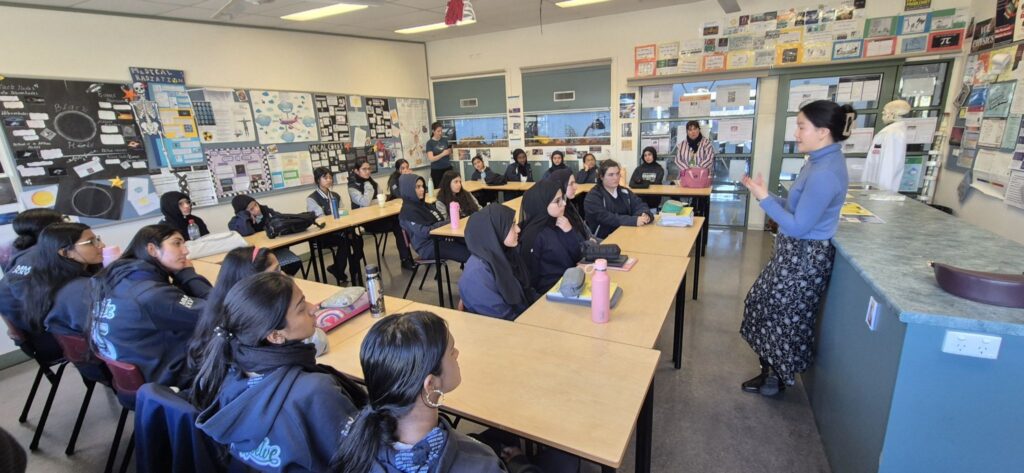
More updates available via Ourschool’s LinkedIn page or Ourschool’s website
Partner Messages
Partner messages
Brand new, ready-to-go lessons for Science, History, Geography, Civics and Citizenship, Economics and Business are waiting for you to explore.



The Victorian Academy of Teaching and Leadership delivers world-class professional learning and resources that strengthen teaching and leadership, improve student outcomes and elevate the profession.
Explore the highlights below or visit the Academy website for further professional learning opportunities.
The Knowledge Gap: Natalie Wexler – commences 11 November 2025
This one-time seminar gives school and system leaders the opportunity to hear author, and internationally renowned education leader, Natalie Wexler discuss evidence-informed literacy practices and educational inequity across the globe.
Unlocking Potential: Principal Preparation – commences 2 February 2026
Deepen your understanding of the complex role of principal by increasing your professional knowledge, capabilities and dispositions to influence student learning outcomes, collective efficacy and schoolwide improvement.
Academy Facilitator Program – commences 19 February 2026
Extend yourself as a leader of professional learning, and equip yourself with the knowledge, confidence and skills to facilitate across a range of different settings including your school and network.
Inspiring School Pride and Confidence – commences 25 March 2026
Develop an understanding of how school pride is linked to lifting student engagement and connectedness by exploring a range of business-industry concepts to enhance the identity, brand and reputation of your school.
Subscribe to the Academy Connect newsletter to stay up to date with professional learning. Phone: 03 8199 2900
Provisional Appointments
VASSP would like to congratulate the following provisionally appointed leaders.
Adam Cribbes – Fitzroy High School |
Rod Kendall – Hoppers Crossing Secondary College |
Harold Cheung – Gladstone Park Secondary College |
Paris Hardwick – Edenhope P-12 College |
Debra Francis – Williamstown High School |
Harveen Khera – Wulerrp Secondary College |
Jodi Wilson – Wulerrp Secondary College |
Sam Turner – Yuille Park Community Coll |
Beau Guest – Yuille Park Community Coll |
Richard Hastings – Keysborough Secondary College |
William Van Driel – Epping Secondary College |
Kim Sohnle – Epping Secondary College |
David Morris – Charles LaTrobe P-12 College |
Ashleigh Marruso – Baden Powell P-9 College |
Chloë Jackson – Healesville High School |
Teagan Snowling – The Grange P-12 College |
Danh Nguyen – Sunshine College |
Emmie Keung – Sunshine College |
Huy Le – Sunshine College |
Annalene Davis – Mernda Central P-12 College |
Jack Mansfield – Mernda Central P-12 College |
Rebecca Lewis – Mernda Central P-12 College |
Lauren Christian – Mernda Central P-12 College |
Renee Short – The Lakes South Morang College |
Jessica Jacobsen – Tarneit Senior College |
Robyn Bewley – Tarneit Senior College |
Jaclyn Levasseur – Tarneit Senior College |
Kristy Bannister – Lowanna College |
Emily O’brien – Bass Coast College |
Jesse Boyd – Bass Coast College |
Alison Gill – Bass Coast College |
Sneza Vasilevski – Tarneit P-9 College |
Ben Toyne – Tarneit P-9 College |
Paul Young – Laverton P-12 College |
Michael Sperling – Bayside P-12 College |
Adrian Ferres – Blackburn High School |
Anthony Ellul – Greensborough Secondary College |
Nicholas Heading – Greensborough Secondary College |
Jorgia Foster – Berwick Secondary College |
Elisse Burke – Kurnai College |
Rian LaBrooy – Nossal High School |
Shalika Sharma – Wyndham Central Secondary College |
Ashlea Gell – Lilydale Heights College |
Emma Steeper – Lilydale Heights College |
Louise Martin – Lilydale Heights College |
Emily Gerson – Lilydale Heights College |
Damien Stingell – Bundoora Secondary College |
Jane Gibson – Balwyn High School |
Amy Lawson – Balwyn High School |
Clarissa Leach – Hoppers Crossing Secondary College |
Kimberley Ruddock – Hoppers Crossing Secondary College |
Meredith Selman – Hoppers Crossing Secondary College |
Tahlia Sinclair – Wodonga Middle Years College |
Jessica Tenison-Woods – Wodonga Middle Years College |
Jessica Mitchell – Wodonga Middle Years College |
Jahla Hunt – Wodonga Middle Years College |
Bianca Collins – Wodonga Middle Years College |
Amanda Barron – Wodonga Middle Years College |
Pheelix Mcclelland – Wodonga Middle Years College |
Michael Hosking – Wodonga Middle Years College |
Heather Clarke – Wodonga Middle Years College |
Cameron Middleton-Else – Wodonga Middle Years College |
Madhavie Amarasinghe – Brinbeal Secondary College |
Christopher Vella-Van Kassel – Brinbeal Secondary College |
Benjamin Gio – Rosehill Secondary College |
Alexander Vincent – Rosehill Secondary College |
Paul Rogers – University High School |
Amarinda Long – University High School |
Mercedes Marsh – University High School |
Cassandra Allan – University High School |
Isabella Miller – University High School |
Justin Wischusen – University High School |
Laura Marks – University High School |
Matthew Sires – Mount Eliza Secondary College |
Nicole Kerr – Mickleham Secondary College |
Samantha Hyndes – Mickleham Secondary College |
Mark Rodgers – Mickleham Secondary College |
Sunita Badhwar – Mickleham Secondary College |
Karla Campos – Mickleham Secondary College |
Jayden Perez – Mickleham Secondary College |
David Payne – Mickleham Secondary College |
Grace McCaull – Mickleham Secondary College |
Karla Simiane – Mickleham Secondary College |
Joel Di Martino – Mickleham Secondary College |
Rose Elcheikh – Mickleham Secondary College |
Julia Rossi – Mickleham Secondary College |
Tara Creek – Mickleham Secondary College |
Zoe Koutkos – Mickleham Secondary College |
Kobe Hay – Mickleham Secondary College |
Deeana Audino – Mickleham Secondary College |
Mark Koutroubas – Bemin Secondary College |
Shane Edge – Bemin Secondary College |
Beornn McCarthy – Bemin Secondary College |
Ellyza Tanner – Craigieburn Secondary College |
Nicole Wingrave – Craigieburn Secondary College |
Sophie O’Brien – Craigieburn Secondary College |
Carl Trewin – Craigieburn Secondary College |
Rebecca O’Brien – Buckley Park College |
Connie Stella – Keilor Downs Secondary College |
Mitchell Stone – Boronia K-12 College |
Leanne Petroff – University High School |
Gemma Roadnight – Bundoora Secondary College |
Hernan Alonso – Balwyn High School |
Sylvie Tang – Balwyn High School |
Siobhan Mahony – Balwyn High School |
Teaghan Gibson – Balwyn High School |
Nicole Houlihan – Balwyn High School |
Daniel Kilgore – John Monash Science School |
Janine Poole – The Grange P-12 College |
Mirlinda Redzep – The Grange P-12 College |
Katrina Thomson – The Grange P-12 College |
Anne Englebretsen – The Grange P-12 College |
Alex Moyer – Brunswick Secondary College |
Pooja Sharma – Keilor Downs Secondary College |
Aurora Frattali – Charles LaTrobe P-12 College |
Kate Gould – Charles LaTrobe P-12 College |
Lyndal Scolyer – Gleneagles Secondary College |
Bradley Petter – Lavers Hill K-12 College |
Alana Vallas – Edenbrook Secondary College |
Dee Longwill – Clyde Secondary College |
Dhiraj Prahaladh – Clyde Secondary College |
Susannah Quick – Clyde Secondary College |
Sarah Mott – Staughton College |
Abigail Grace – Staughton College |
Bree Harris – Melbourne Girls College |
Patrick Eldridge – Kurunjang Secondary College |
Stephen Stellini – Kurunjang Secondary College |
Joel McDougall – Nth Geelong Secondary College |
Tracey Clark – Nth Geelong Secondary College |
Eu Vin Hor – Staughton College |
Sarah Birchall – Staughton College |
Kathleen Lam – Staughton College |
Nathan Gavillucci – Mernda Central P-12 College |
Cheyne Brown – Mernda Central P-12 College |
Sally Jackman – Vermont Secondary College |
Adam Ammouche – Copperfield College |
Tane Cane – Charles LaTrobe P-12 College |
Zoe Murdoch – McKinnon Secondary College |
Alison Hausler – Edenhope P-12 College |
Katherine Smith – Gisborne Secondary College |
Jo Hammer – Port Melbourne Sec College |
Catherine Blackburne – Patterson River Secondary Coll |
Atish Basant – Victoria University SC |
Anna Bonanno – Victoria University SC |
Taylah Boonstra – Keysborough Secondary College |
Belle Summer – MacRobertson Girls High School |
Robert Westwood – University High School |
Rebecca Jepson – University High School |
Jessica Bloom – University High School |
Joshua Wolter – University High School |
Corinne Pearce – University High School |
Matthew Baxter – University High School |
Lucinda Turner – Carrum Downs Secondary College |
Lian Battle – Cranbourne East Sec. College |
David Kaberry – Victorian School Of Languages |
Esra Orsdemir – Victorian School Of Languages |
Timothy Harris – Homestead Senior Sec College |
Michael Cristino – Kurunjang Secondary College |
Alex Clarke – Sunshine College |
Stuart Myers – Matthew Flinders Girls SC |
Maja Ilic – Rosehill Secondary College |
Bryce Denny – Lilydale Heights College |
Shannon Sargeant – Lilydale Heights College |
Emine Alimovska – Hoppers Crossing Secondary College |
Clare Halvey – Hoppers Crossing Secondary College |
Tahnee Curtain – Hoppers Crossing Secondary College |
Jennifer Ewart – Hoppers Crossing Secondary College |
Emma McIntyre – Hoppers Crossing Secondary College |
Cassandra Hardy – Hoppers Crossing Secondary College |
Avril Good – Kolorer College |
Sarah-Anne Christoffelsz – Emerald Secondary College |
Caitlin Saliba – Emerald Secondary College |
Kulvir Sidhu – William Ruthven Sec. College |
Suzanne Ross – Lyndale Secondary College |
Eric Goon – Hume Central Secondary College |
Trillian Ralston – Point Cook P-9 College |
Joanna Inness – Point Cook P-9 College |
Kristy Ryan – Clyde Secondary College |
Warda Waliuddin – Clyde Secondary College |
Deb Gribben – Clyde Secondary College |
Holly Ballard – Tarneit P-9 College |
Prunelle Prahaladh – Clyde Secondary College |
Jessica Lucas – Clyde Secondary College |
Mary McCarthy – Werribee Secondary College |
Hannah Wilson – Blackburn High School |
Cheryl Angus – Blackburn High School |
Lauren Van Der Westhuizen – Blackburn High School |
Mike Hall – Blackburn High School |
Stacee Reddy – South Oakleigh College |
Holly Gilbert – Mernda Central P-12 College |
Abby Harders – Mernda Central P-12 College |
Kathrine Polak – Mernda Central P-12 College |
Billie Flask – Mernda Central P-12 College |
Jonathon Rogers – Heathmont College |
Craig Kennedy – Berwick Secondary College |
Tuncay Islek – Victoria University SC |
Melissa Hughes – Eltham High School |
Grace Robertson – Macleod College |
Thomas Barnes – Bass Coast College |
Cameron Ritchie – Bass Coast College |
Lauren Lees – Bass Coast College |
Ajay Eapen – The Grange P-12 College |
Anthony Keatch – Vermont Secondary College |
Alice Nixon – Sunbury Downs Secondary College |
Camilla Bishop – Bayside P-12 College |

